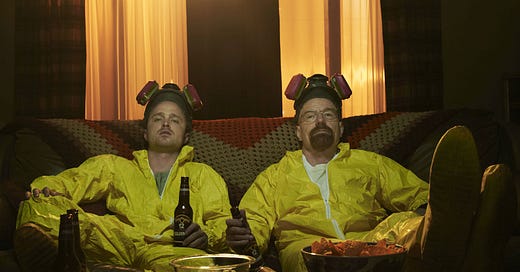by Ryan Fan
I’m about to admit what I have been told is my worst hot take: spoilers make watching TV or movies better. I’ll even go as far as to say that spoilers make reading books better. I like seeing how something happens much more than I like seeing what happens.
People hate this take because I have gotten in trouble spoiling different TV shows, movies, and books for others. I will always remember in fifth grade, where I spoiled Nothing But the Truth by Avi, and my teacher reprimanded me — why would my classmates, who were only halfway through the book, want to read it after I just spoiled the ending?
Fortunately, I have matured and learned not to impose my beliefs on spoilers about other people. But whenever I am fully immersed in a TV show, movie, or book, and can’t finish it all in one sitting, I always look up what happens. I’m currently on season 5 of The Sopranos, and that’s right: I already looked up what happened.
I can’t explain why — it just makes the show better to watch and more exciting. Derek Thompson at The Atlantic talks about how he accidentally spoiled the ending of Breaking Bad to his friend after telling a joke about the show. His friend felt betrayed, and utter a profanity-laced tirade at him, and then made him pay for breakfast.
His article, titled “In Defense of Spoilers,” spoils a lot of Breaking Bad, to no surprise. But he calls his relationship with the friend he spoiled the show with as “a relationship I nearly obliterated,” and sometimes when we navigate social media, it’s impossible to avoid spoilers.
But Thompson and myself don’t agree that spoilers ruin your viewing experience, ashe argues that anticipation is an overrated aspect of TV shows and that spoilers don’t ruin shows. While waiting for the twist, we often don’t notice many aspects of a film or show.
“How does giving away the ending make us enjoy mysteries even more?” Thompson asks. “One theory is that our anticipation of surprises actually takes away from our appreciation for the 99 percent of the movie that isn’t a monster twist.”
Thompson also propels the theory that people like predictability more than they’re willing to admit. I remember when I taught Oedipus Rex to my summer school students — I spoiled that Oedipus marries and sleeps with his mother and kills his father right away.
On a personal level, I just looked up the ending of Better Call Saul because I can’t wait to see what happens. I won’t spoil things for myself because I hate suspense, but rather because I am impatient and feel too much suspense. I’m at a very high-suspense.
Psychology professor Nicholas Christenfeld at UC San Diego has found that spoilers make you enjoy a story more. His team had an experiment where he had subjects read short stories of various genres and rate how much they liked the story at the end. One group just read the story. Another group read the story and had the researchers spoil the narrative to the story by giving an introduction that spoiled the plot.
“What we found, remarkably, was if you spoil stories they actually enjoy them more,” Christenfeld said.
He repeated the experiment with mystery stories, ironic twist stories, and stories with surprise endings. He also included literary fiction with neat resolutions. Christenfeld cites people going to watch Romeo and Juliet — most people that watch it know what happens. Everyone who watches a romantic comedy knows that a couple will probably be happy at the end.
Do you ever notice how the second time, and then the third time you watch or read something is better? I certainly do. I’ve watched The Wire seven times, and it gets better every time.
As to why so many people enjoy spoilers, Christenfeld and his team did a follow-up study in the Scientific Study of Literature. They found that people didn’t just enjoy spoilers because they knew the ending, but that spoilers helped viewers or readers understand the overall narrative’s purpose and incorporate all the details and plot points better.
“If you know the ending as you watch it, you can understand what the filmmaker is doing. You get to see this broader view, and essentially understand the story more fluently,” explained Christenfeld. “There’s lots of evidence that sort of this fluent processing of information is pleasurable; that is, some familiarity with a work of art enables you to enjoy it more.”
So no, I will not go around telling people spoilers to whatever show they’re watching because it’s mean. But I have felt a pang of intrinsic overwhelming guilt that comes when I look up spoilers. People shame me for it, for one, but now, since spoilers have actually made my reading and watching experiences better. Now that I have psychological research that backs up my spoiler tendencies, I will say it loud and proud:
I love spoilers, and I’m not ashamed.




